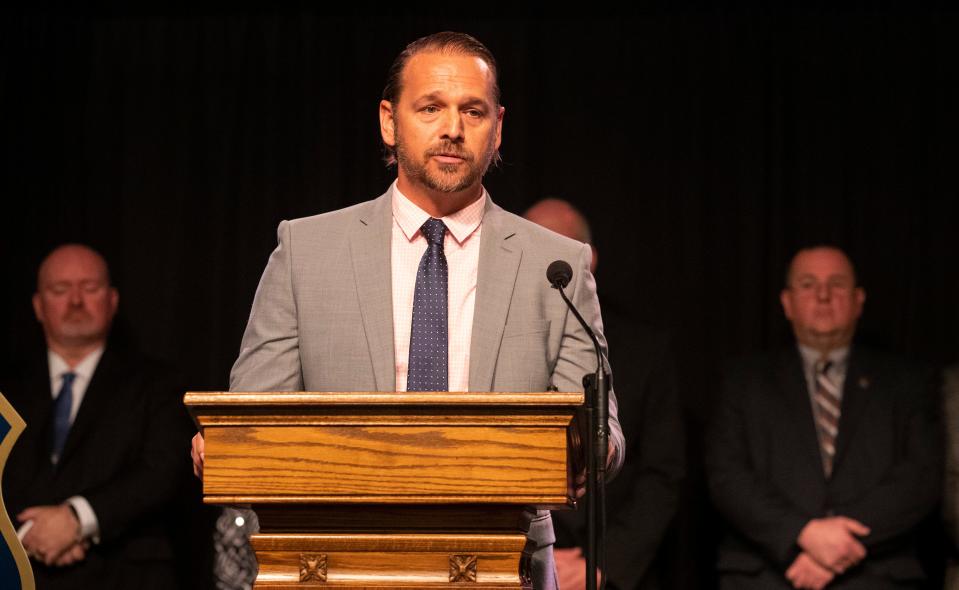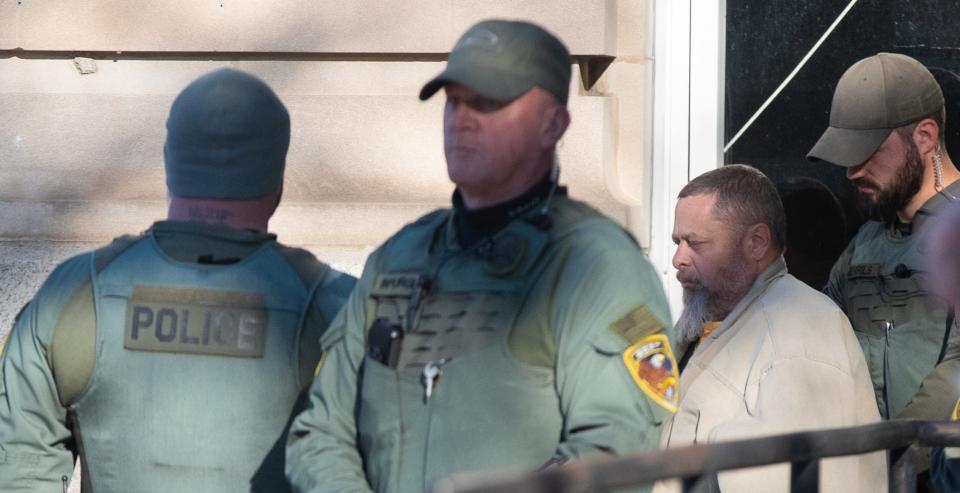Prosecutor in Delphi murders case wants Odinism testimony left out of trial
Carroll County Prosecutor Nicholas McLeland is asking the judge in the Delphi murder case to prevent testimony about Odinism, cult or ritualistic killing and other pieces of evidence from being presented to the jury, arguing they're irrelevant, unfounded and misleading.
In a motion filed Monday, McLeland listed a dozen items he contends defense attorneys should not be allowed to mention, comment on, or reference in any way during the trial. These include purported evidence that Delphi teenagers Abigail Williams and Liberty German were killed by a group of Odinists ― a key part of Allen's defense.
"Before any such evidence may be permitted the Defense must show some connection between the 3rd party and the crime," McLeland wrote. "Further it must be a direct connection based on admissible evidence and not founded in hearsay, speculation, rumors, conjecture or theory."

Allen is facing four murder charges for the teens' deaths and is scheduled to go to trial in two weeks. The girls disappeared Feb. 13, 2017 while on a hike along Carroll County's Monon High Bridge Trail. Their bodies were found the following day.
Allen, who worked at a local pharmacy, was arrested almost six years later. Investigators alleged an unfired bullet at the crime scene was ejected from Allen's semiautomatic pistol. His attorneys, Andrew Baldwin and Bradley Rozzi, also have alleged that a group of Odinists killed Abby and Libby during a sacrificial ritual in the woods.
McLeland is asking Special Judge Frances Gull to bar defense attorneys from mentioning names of alleged Odinists, as well as any references to an investigation by Todd Click, the former Rushville police chief who had looked into the possibility that three men from Rush County, about two hours southeast of Delphi, might be involved in the killings.
One of those men told his sister he was there when the girls were killed and described details about the crime scene that had not been released publicly, according to a 136-page memorandum filed by the defense attorneys. Click is one of the defense witnesses, but last week, McLeland sought the former police chief's personnel records that he believes will raise credibility issues. Gull approved the prosecutor's motion to obtain the records.

McLeland is also asking Gull to prevent any mention of Kegan Kline, his father, Jerry Kline, and Ron Logan, who owned the property where the girls' bodies were found.
Kegan Kline was never a suspect in the girls' deaths but was linked to the case after investigators found he'd used a fake social media profile to communicate with one of the girls in the months before they were killed. Kegan Kline is now in prison for child exploitation and other crimes in an unrelated case.
The state is also asking Gull to prevent defense attorneys from making any personal attacks against prosecutors, sharing personal opinions about any evidence or witnesses, and commenting on how files that were turned over to the defense were labeled.
McLeland also filed responses Friday to Baldwin and Rozzi's call for sanctions against the prosecutor, which, if approved, would limit McLeland's ability to object to specific evidence or rebut specific evidence.
Allen's attorneys base their motion on their claims of not timely receiving discovery evidence, and in some cases, claiming not to receive it at all.
More: Delphi defense team calls for sanctions against the prosecutor
McLeland's rebuttal is that not all evidence is discovery, citing precedent that only evidence that will be used at trial and possible exculpatory evidence is required to be shared with the defense.
Nevertheless, McLeland's response indicates that the state has shared all of its information — 26 terabytes worth — with Allen's attorneys. They've even resent specific evidence when asked by Baldwin or Rozzi, McLeland argues.
McLeland rebuts the defense's claims of misleading or lying to the defense team.
The prosecutor said they turned over all documents from the six-year investigation in a timely manner, so sanctions are not merited.
Allen's attorneys last week filed a motion to suppress anything Allen said on Oct. 26, 2022, during an interview with Indiana State Police Lt. Jerry Holeman, who they say did not tell Allen he was free to go instead of staying to be interrogated.
McLeland addressed that Friday in his response, indicating that Allen was advised of his rights, even if it's not on the video of the interview.
"Lieutenant Holeman asked Richard Allen if he remembered his Miranda rights that other detectives had read him thirteen days prior, and Allen said yes," McLeland states in the rebuttal, referring to an Oct. 13, 2022, interview with police.
Allen was not in custody during the Oct. 26, 2022, interview, McLeland argues. Therefore, reading Allen his Miranda rights was not necessary since it was a voluntary interview without coercion, McLeland argues. Since Allen was free to leave, his rights were not violated, McLeland contends.
Gull had not ruled on Allen's motions for sanctions and his motion to suppress his Oct. 26, 2022, statements early Monday afternoon. She also has not ruled on McLeland's motion to restrict what defense may present to the jury.
After that Oct. 26, 2022 interview, Allen was arrested on suspicion of murder. He was charged two days later. Yet the Indiana State Police did not identify Allen or his arrest until Oct. 31, 2022, which likely violated the state's open record laws that require arresting agencies to identify those who are arrested within 24 hours of their incarceration.
More: Official: Richard Allen arrest records should not have been sealed
Allen's trial is scheduled to start on May 13 with jury selection in Fort Wayne. After jurors are seated, the trial will move to Carroll County.
This article originally appeared on Indianapolis Star: Delphi murders: Prosecutor wants Odinism left out of Allen trial